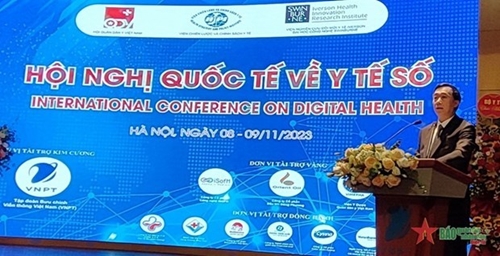The hybrid event on November 8 - 9 was put on by the Vietnam Military - Civil Medicine Association, the Health Strategy and Policy Institute under the Vietnamese Ministry of Health (MoH), and the Iverson Health Innovation Research Institute at the Swinburne University of Technology of Australia.
In Vietnam, digital transformation and the building of a digital government, a digital economy and a digital society are identified as an important pathway for the country. In the digital transformation program for the health sector by 2025 with a vision to 2030, the MoH targets that smart healthcare will have taken shape by 2025 with the three focuses of smart disease prevention, smart medical examination and treatment, and smart health administration.
    |
 |
|
Deputy Minister of Health Tran Van Thuan addresses the international conference on digital healthcare in Hanoi on November 8. |
In his remarks at the conference, Deputy Minister of Health Tran Van Thuan said digital transformation is a focal task of the health sector, which needs to prioritize resources for boosting information technology and digital transformation to improve specialized capacity, management effectiveness, and people’s access to medical services.
He emphasized the necessity for the engagement, resources, and wisdom of the entire health sector, people, and enterprises, as well as the cooperation and assistance from international partners.
Assoc. Prof., Dr. Tran Quy Tuong, Chairman of the Vietnam Health Informatics Association, noted digital transformation in health care is intended to help people better access and use highly effective medical services, and receive continuous and life-long health protection, care, and improvement. It will contribute to a modern, quality, equal, and effective health system well integrating into the world.
However, the process is facing a number of difficulties, including poor infrastructure that hinder the application of electronic medical records in many hospitals, and the shortage of a financial mechanism for IT application in healthcare. Other limitations include limited IT skills of medical workers, the shortage of IT manpower as well as standards and guidance for connecting data among medical information systems, Tuong pointed out.
Assoc. Prof., Dr. Pham Le Tuan, Chairman of the Vietnam Military - Civil Medicine Association, considered the conference as the start of the cooperation between scientists and experts of Vietnam and Australia to help Vietnam build a national action plan on digital transformation in health care.
At the event, participants shared experiences in developing and applying digital health apps, managing health data, using the internet for telemedicine, and digitalizing primary healthcare. This is also a chance for insiders to introduce their Industry 4.0 technological products for the healthcare industry.
Source: VNA